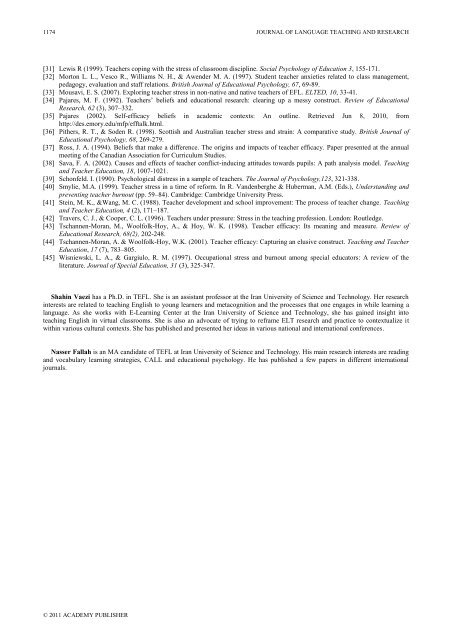Journal of Language Teaching and Research Contents - Academy ...
Journal of Language Teaching and Research Contents - Academy ...
Journal of Language Teaching and Research Contents - Academy ...
Create successful ePaper yourself
Turn your PDF publications into a flip-book with our unique Google optimized e-Paper software.
1174<br />
© 2011 ACADEMY PUBLISHER<br />
JOURNAL OF LANGUAGE TEACHING AND RESEARCH<br />
[31] Lewis R (1999). Teachers coping with the stress <strong>of</strong> classroom discipline. Social Psychology <strong>of</strong> Education 3, 155-171.<br />
[32] Morton L. L., Vesco R., Williams N. H., & Awender M. A. (1997). Student teacher anxieties related to class management,<br />
pedagogy, evaluation <strong>and</strong> staff relations. British <strong>Journal</strong> <strong>of</strong> Educational Psychology, 67, 69-89.<br />
[33] Mousavi, E. S. (2007). Exploring teacher stress in non-native <strong>and</strong> native teachers <strong>of</strong> EFL. ELTED, 10, 33-41.<br />
[34] Pajares, M. F. (1992). Teachers’ beliefs <strong>and</strong> educational research: clearing up a messy construct. Review <strong>of</strong> Educational<br />
<strong>Research</strong>, 62 (3), 307–332.<br />
[35] Pajares (2002). Self-efficacy beliefs in academic contexts: An outline. Retrieved Jun 8, 2010, from<br />
http://des.emory.edu/mfp/efftalk.html.<br />
[36] Pithers, R. T., & Soden R. (1998). Scottish <strong>and</strong> Australian teacher stress <strong>and</strong> strain: A comparative study. British <strong>Journal</strong> <strong>of</strong><br />
Educational Psychology, 68, 269-279.<br />
[37] Ross, J. A. (1994). Beliefs that make a difference. The origins <strong>and</strong> impacts <strong>of</strong> teacher efficacy. Paper presented at the annual<br />
meeting <strong>of</strong> the Canadian Association for Curriculum Studies.<br />
[38] Sava, F. A. (2002). Causes <strong>and</strong> effects <strong>of</strong> teacher conflict-inducing attitudes towards pupils: A path analysis model. <strong>Teaching</strong><br />
<strong>and</strong> Teacher Education, 18, 1007-1021.<br />
[39] Schonfeld. I. (1990). Psychological distress in a sample <strong>of</strong> teachers. The <strong>Journal</strong> <strong>of</strong> Psychology,123, 321-338.<br />
[40] Smylie, M.A. (1999). Teacher stress in a time <strong>of</strong> reform. In R. V<strong>and</strong>enberghe & Huberman, A.M. (Eds.), Underst<strong>and</strong>ing <strong>and</strong><br />
preventing teacher burnout (pp. 59–84). Cambridge: Cambridge University Press.<br />
[41] Stein, M. K., &Wang, M. C. (1988). Teacher development <strong>and</strong> school improvement: The process <strong>of</strong> teacher change. <strong>Teaching</strong><br />
<strong>and</strong> Teacher Education, 4 (2), 171–187.<br />
[42] Travers, C. J., & Cooper, C. L. (1996). Teachers under pressure: Stress in the teaching pr<strong>of</strong>ession. London: Routledge.<br />
[43] Tschannen-Moran, M., Woolfolk-Hoy, A., & Hoy, W. K. (1998). Teacher efficacy: Its meaning <strong>and</strong> measure. Review <strong>of</strong><br />
Educational <strong>Research</strong>, 68(2), 202-248.<br />
[44] Tschannen-Moran, A. & Woolfolk-Hoy, W.K. (2001). Teacher efficacy: Capturing an elusive construct. <strong>Teaching</strong> <strong>and</strong> Teacher<br />
Education, 17 (7), 783–805.<br />
[45] Wisniewski, L. A., & Gargiulo, R. M. (1997). Occupational stress <strong>and</strong> burnout among special educators: A review <strong>of</strong> the<br />
literature. <strong>Journal</strong> <strong>of</strong> Special Education, 31 (3), 325-347.<br />
Shahin Vaezi has a Ph.D. in TEFL. She is an assistant pr<strong>of</strong>essor at the Iran University <strong>of</strong> Science <strong>and</strong> Technology. Her research<br />
interests are related to teaching English to young learners <strong>and</strong> metacognition <strong>and</strong> the processes that one engages in while learning a<br />
language. As she works with E-Learning Center at the Iran University <strong>of</strong> Science <strong>and</strong> Technology, she has gained insight into<br />
teaching English in virtual classrooms. She is also an advocate <strong>of</strong> trying to reframe ELT research <strong>and</strong> practice to contextualize it<br />
within various cultural contexts. She has published <strong>and</strong> presented her ideas in various national <strong>and</strong> international conferences.<br />
Nasser Fallah is an MA c<strong>and</strong>idate <strong>of</strong> TEFL at Iran University <strong>of</strong> Science <strong>and</strong> Technology. His main research interests are reading<br />
<strong>and</strong> vocabulary learning strategies, CALL <strong>and</strong> educational psychology. He has published a few papers in different international<br />
journals.

















